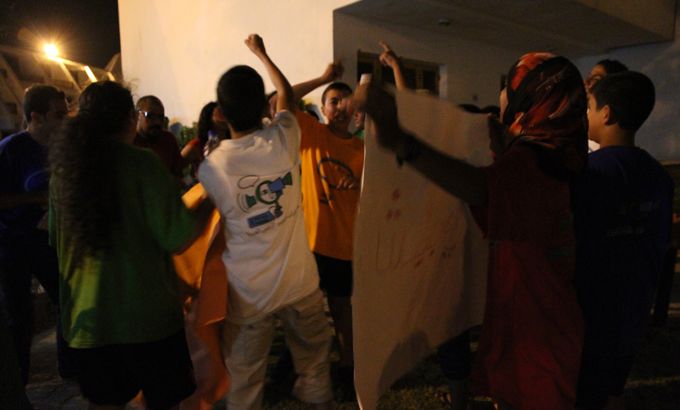
Democracy Camp
A group of Arab teenagers begins to understand free expression as seismic political changes shake their world.
In the summer of 2011, rebellion is in the air at a children’s camp in Egypt. Encouraged to express themselves freely and influenced by the heady revolutionary waves of the so-called Arab Spring, the teenage participants at the camp begin an uprising – against their own camp management.
But after the initial euphoria of rebellion, partisan divisions emerge and the children discover for themselves that democracy is more complicated than they had imagined. And on their return home – to Egypt, Tunisia, Yemen and the West Bank – they struggle to find a voice, and a path, for themselves among the upheaval of the seismic socio-political changes taking place across the region.
Filmed over several months, Democracy Camp centres on four main characters: Rahma from Yemen, Hamza from Tunisia, Moustafa from Egypt and Anmar from Palestine. These four teenagers represent the range of thought and change across the Arab world, and through them the film explores the political and social awakening being experienced by millions of children.
FILMMAKER’S VIEW
By Ismail Elmokadem and Zahra Mackaoui
We wanted to create a kind of utopia where kids could dream about revolutions. All of us in the Arab world are experiencing the same thing now and these kids represent the changes taking place in the region. And for two weeks, they'll live in an open environment where they are given the tools so they can express themselves
Shortly after the Egyptian revolution we met with the founders of the Arab Digital Expression Camp, an unconventional project targetting Arab teenagers.
Currently in its fifth year, the camp is intended to operate as a kind of utopia; where kids have a great deal of autonomy and freedom that they can exploit through digital mediums.
2011 was a special year because many of the kids were coming directly from experiencing revolutions, uprisings and political conflicts in their home countries. The camp, amongst other things, could act as an outlet for their revolutionary impulses.
We took a risk and decided to go, with a skeleton crew and minimal equipment, not sure of what we would find. Upon arrival we discovered that this was not a boot camp in the traditional sense, but a four-star hotel on the banks of the Suez Canal. In many ways it seemed an unlikely spot for any kind of dissent.
Indeed, for the first few days the kids obediently settled into a routine of doing morning exercises, taking classes in blogging, sound recording, cinema, and eating cafeteria meals.
We all want the same thing for the Arab world. We want freedom and democracy just like in the West and the whole world needs to know this
But on Day Four, a group of kids decided to use their new-found autonomy to criticise the way the camp was being run. They wanted to be involved in the administration’s decision-making process.
A campaign was launched to prepare for a protest, and the kids who initiated the idea started enlisting recruits and writing banners for the demonstration. Everything was going according to plan.
But soon divisions began to emerge when a rival group tried to take control of the demonstration, leading to further conflict between the kids. Campers were forced to admit that democracy was messier than they had imagined.
Eventually the kids overcame their differences and began to process their emotions through their creative works at the camp.
A year later, we returned to visit our four central characters back home in Yemen, Egypt, Tunisia, and Palestine to find out what they had to say about the future of democracy in the Arab world.